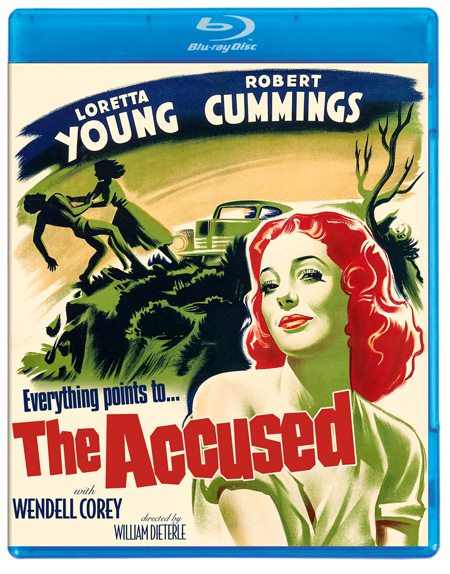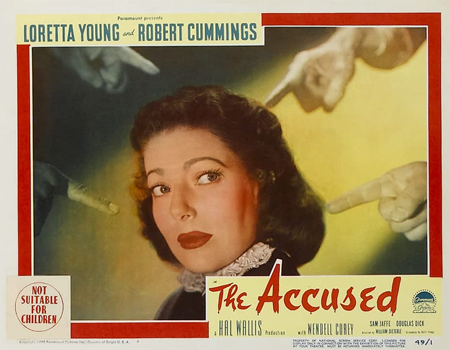
“MURDER
OR SELF DEFENSE?â€
By
Raymond Benson
This
compelling 1949 melodrama—it can’t quite be called film noir due to a
lack of many of the traits associated with that cinematic movement—would have a
field day in the era of #MeToo. It was made during 1948 (released in January
’49) while the Production Code was still in effect. While it was taboo to say
that the protagonist, Dr. Wilma Tuttle (Loretta Young), is “sexually assaultedâ€
by one of her students at the college where she teaches psychology (it’s
obvious that this is what occurs in front of our eyes on the screen), it’s
perfectly fine for the investigating homicide detective, Lt. Dorgan (Wendell
Corey), to make harassing sexual innuendos and sexist remarks about the woman
he suspects of murder, not only to her face but to all the other men in the
room while she’s present. But it was 1948, not that this is an excuse.
That
said, The Accused, directed by William Dietele and produced by the
inimitable Hal B. Wallis for Paramount Pictures, is fairly riveting,
well-acted, and superbly written (by Ketti Frings, based on the novel Be
Still, My Love by June Truesdell). Note that both the novel and the
screenplay are written by women, making The Accused somewhat a rare
feminist statement for the time.
Wilma
(Young) is harassed by student Bill Perry (Douglas Dick), a handsome but
arrogant womanizer who has perhaps already gotten a fellow student (Suzanne
Dalbert) “in trouble.†In the interest of counseling Perry, Wilma agrees to be
given a ride home. Instead, Perry takes her to a secluded cliff in Malibu
overlooking the ocean, where he proceeds to enact an attempted rape. Wilma
clobbers him on the head, killing the young man. Obviously, she was defending
herself. She panics, though, and decides to stage the death by making it appear
that Perry jumped and committed suicide. Later, Perry’s “guardian†and
attorney, Warren Ford (Robert Cummings), appears to settle Perry’s affairs and
becomes embroiled in the police investigation. Ford meets Wilma and falls in
love—and she with him, too. However, Wilma is besieged by guilt and flashbacks
of the “crime,†sometimes inexplicably speaking hints of what she’d done as if
she were talking in her sleep. Lt. Dorgan (Corey) suspects her, but he also
wants to date her, and there is a bit of rivalry with Ford for her hand. As the
story progresses, evidence is uncovered that points to Wilma as Perry’s killer…
will she be arrested? And if so, can she convince a jury that she had acted in
self-defense?

Loretta
Young had just enjoyed great success as the lead in The Farmer’s Daughter (1947).
She was cast in The Accused, replacing Hal Wallis’ intended casting
choice, Barbara Stanwyck (she refused the part). Then, Young won the
Oscar for The Farmer’s Daughter, elevating her stock even higher. Would
she have taken such a potboiler role in The Accused had she known she
would soon be an Oscar-winning actress? Who knows… That said, Young is quite
good in The Accused, although her character seems to wilt in fear and
uncertainty way too often.
Robert
Cummings is fine, but Wendell Corey is a bit too slimy and predatory for
believability. Maybe in 1949 it was realistic for a cop to come on to his
suspect, but now it just feels creepy. Douglas Dick is frightening as the
sociopathic student, and Sam Jaffe is always fun to watch (here he is the
police forensics guy).
The
ending is surprisingly ambiguous as to whether Wilma walks away free from her
trial. No spoilers here, but Lt. Dorgan has a final line that points to how
this is going to go. A message to women everywhere regarding assault and
self-defense? Perhaps. Very bold for 1949.
Kino
Lorber’s new Blu-ray looks satisfactory in its restoration. It comes with an
audio commentary by film historian Eddy Von Mueller. The only supplement is the
theatrical trailer, along with other Kino trailers.
The
Accused is
for fans of Loretta Young, melodramatic crime pictures, and Hollywood in the
late 1940s.
CLICK HERE TO ORDER FROM AMAZON